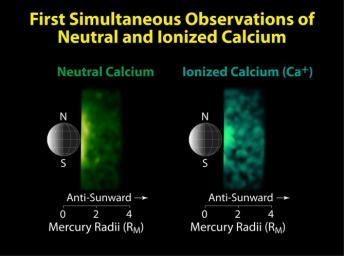
|
The First Simultaneous Observations of Neutral and Ionized Calcium
- Click the image above for a larger view
- Full-Res JPEG (1020 x 759) (68.9 kB)
- Full-Res TIFF (1020 x 759) (2.3 MB)
Caption:
Shown here are the first observations of emission from ionized calcium in Mercury's tail region compared with simultaneous observations of neutral calcium. Neutral calcium is rapidly converted to ionized calcium by sunlight, explaining the generally rapid decrease of neutral calcium away from the planet. The high degree of correlation between the two observed distributions reflects the rapid conversion of neutrals to ions and demonstrates that ionized calcium represents a significant fraction of the overall calcium abundance. Simultaneous measurement of the abundances of calcium neutrals and ions is therefore necessary to determine accurately the total calcium abundance in Mercury's exosphere. This situation is in contrast to that for sodium and magnesium , which are ionized much more slowly. The significantly longer lifetime for neutral magnesium may explain why its abundance is more widely distributed in the tail region than calcium.
Date Acquired:
September 29, 2009
Instrument:
Mercury Atmospheric and Surface Composition Spectrometer (MASCS)
Background Info:
These images are from MESSENGER, a NASA Discovery mission to conduct the first orbital study of the innermost planet, Mercury. For information regarding the use of images, see the MESSENGER image use policy .
Cataloging Keywords:
| Name | Value | Additional Values |
|---|---|---|
| Target | Mercury | |
| System | ||
| Target Type | Planet | |
| Mission | MESSENGER | |
| Instrument Host | MESSENGER | |
| Host Type | Orbiter | |
| Instrument | Mercury Atmospheric and Surface Composition Spectrometer (MASCS) | |
| Detector | ||
| Extra Keywords | Atmosphere, Color | |
| Acquisition Date | ||
| Release Date | 2009-11-06 | |
| Date in Caption | 2009-09-29 | |
| Image Credit | NASA/Johns Hopkins University Applied Physics Laboratory/Carnegie Institution of Washington | |
| Source | photojournal.jpl.nasa.gov/catalog/PIA12369 | |
| Identifier | PIA12369 | |
